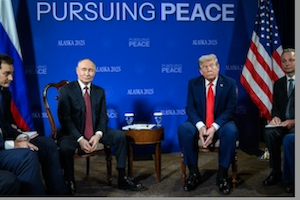World
Trump Says Progress Made in Call with Putin; Both to Meet in Hungary

On the 16th, U.S. President Donald Trump stated that he had a phone call with Russian President Vladimir Putin and that, in an effort to end the Russia-Ukraine war as soon as possible, the two sides will meet in Hungary at a later date. The exact date of the meeting is still under negotiation.
Trump wrote on his social media platform *Truth Social* that he recently received a call from President Putin. At the beginning of the conversation, Putin congratulated the United States on achieving a major peace breakthrough in the Middle East. Trump said he believes that this experience will help advance negotiations with Russia and become a key milestone in efforts to end the Russia-Ukraine war.
This marks the eighth conversation between Trump and Putin this year. The phone call lasted approximately 2.5 hours and included discussions on Middle East peace, post-war economic cooperation between the U.S. and Russia, and plans for a meeting in Budapest, Hungary, within the next two weeks to discuss an end-of-war proposal for the Russia-Ukraine conflict. Trump stated that the call achieved significant progress and could be a major turning point in promoting peace talks to end the war.
U.S. Secretary of State Marco Rubio and other members of the American delegation are scheduled to hold preparatory talks with Russian officials next week to arrange the upcoming summit and lay the groundwork for the meeting between the two leaders.
- 80 reads
Frequent Deaths Linked to Scam-Related Trips to Cambodia: South Korea Issues Travel Ban

According to media reports, due to a sharp rise in job scam, kidnapping, and detention cases involving South Korean nationals in Cambodia, the South Korean Ministry of Foreign Affairs has announced a Level 4 travel alert—*the highest level*, effectively banning travel to Cambodia starting October 16. This comes after a 30-year-old South Korean woman was recently found dead near the Vietnam-Cambodia border. The South Korean government also plans to accelerate the repatriation of Korean scam suspects stranded in Cambodia.
Reports indicate that the South Korean government has identified over 1,000 of its nationals suspected of engaging in fraudulent activities in Cambodia. Between January and August of this year alone, 330 South Koreans went missing after entering the country. On October 14, President Lee Jae-myung stated that the government would mobilize all available resources and take strong diplomatic action to protect its citizens. A task force, led by officials from the Ministry of Foreign Affairs, will be dispatched to Cambodia.
The report also explained that South Korea’s travel advisory system consists of four levels: Blue (Exercise caution), Yellow (Reconsider travel), Red (Advised to evacuate), and Black (Travel prohibited). The newly issued travel ban on Cambodia will be in effect for 90 days. Cambodian police have recently ramped up crackdowns and have arrested hundreds of suspects, including 63 South Korean nationals.
-
- Read more
- 111 reads
Anti-China Sentiment Surges in South Korea; Taiwanese Wear Badges for Protection

At the end of September, the South Korean government began allowing visa-free entry for groups of three or more travelers from mainland China, permitting a stay of up to 15 days. However, repeated incidents of disorderly conduct have triggered a rise in anti-China sentiment across South Korea. In response, many Taiwanese tourists visiting the country have taken to wearing a "Taiwanese badge" — featuring the words "I am Taiwanese" and an image of the national flag (Blue Sky, White Sun, and a Wholly Red Earth) — on their chests to identify themselves and avoid misunderstandings. This move has sparked heated discussions on Korean social media.
South Korea’s decision to open its borders to Chinese tour groups is aimed at stimulating its economy. Nevertheless, anti-China sentiment persists, especially in major tourist areas like Myeong-dong, where anti-China protests have been seen near city government buildings. As tensions rise, Taiwanese citizens have also become unintended targets. In April of this year, a South Korean man in his 30s attacked two Taiwanese tourists with a soju bottle at a bus stop, mistakenly believing they were Chinese after hearing them speak Mandarin in a restaurant.
According to statistics from the Korea Tourism Organization, as of August, one in every three foreign tourists in South Korea was from China. To avoid being mistaken for Chinese nationals, many Taiwanese travelers have started wearing Taiwan badges to distinguish themselves. While the badge may seem like a small measure of protection during travel, it also serves as a reminder that prejudice and hatred often affect more than just a single group — they can spread across an entire society. As we rush to draw boundaries, perhaps what we should consider most is how to calm the hatred. What the world truly needs is peace and love.
- Read more
- 319 reads
Trump Declares End to Gaza War as Hamas Releases Final Group of Hostages

After two years of conflict, U.S. President Donald Trump officially announced the end of the Gaza War on the 13th. According to the ceasefire agreement, Hamas released the final group of Israeli hostages, while Israel released a number of Palestinian prisoners. Families on both sides reunited with their loved ones in Tel Aviv and Gaza, creating emotional scenes.
According to foreign media reports, the Israeli military confirmed that 20 hostages were safely returned across the border by the Red Cross. Thousands of people gathered in Tel Aviv’s "Hostage Square" to celebrate—waving national flags and shedding tears of joy. Similar crowds gathered in Gaza, where around 2,000 freed prisoners arrived at hospitals. Locals chanted slogans such as “Freedom” and “The war is over.”
In a speech before the Israeli parliament, Trump declared: “The skies are calm, the guns are silent, the sirens have stopped, and the sun rises over a land returning to peace.” He described the agreement—brokered by the United States, Egypt, Qatar, and Turkey—as “one of the greatest peace deals in history.”
The agreement includes the release of hostages by Hamas, the release of prisoners by Israel, and the suspension of certain military operations. Following the announcement, Trump and Egyptian President Abdel Fattah al-Sisi hosted a summit in Sharm el-Sheikh, the Red Sea resort city, bringing together more than 20 world leaders to discuss the future governance, security, and reconstruction of Gaza. However, neither Israel nor Hamas attended the summit, and notable absences included Saudi Arabia and the UAE—raising concerns over the agreement’s long-term viability.
Since the war broke out in October 2023, over 68,000 people have died in Gaza during the two-year conflict. The 20 hostages released were the last surviving captives from the 251 Israelis abducted during Hamas’s initial assault. An additional 26 hostages have been confirmed dead, with two still missing.
International humanitarian organizations warn that Gaza is facing extreme shortages of food, medical supplies, and fuel, putting hundreds of thousands of residents at risk. Major unresolved challenges remain, including whether Hamas will disarm, the future governance of Gaza, and ongoing tensions between Israel and Palestinians in the West Bank. These issues will deeply impact the trajectory of the peace process.
- 59 reads
Media: Hamas Transfers All 20 Living Israeli Hostages to the Red Cross

Israeli media reported that on the 13th, the Palestinian militant group Hamas released the last 20 surviving hostages held in the Gaza Strip, handing them over in batches to representatives of the Red Cross. All of the released hostages are men. The first group of seven has safely returned to Israel, while the remaining 13 were transferred in Khan Younis in southern Gaza. This release is part of a ceasefire agreement between Israel and Hamas brokered by the United States, signaling that the two-year-long Gaza war may be nearing its end. The conflict has killed tens of thousands of Palestinians and saw several Israelis taken hostage.
On the same day, U.S. President Donald Trump arrived in Israel aboard Air Force One to a warm public welcome. Israeli President Isaac Herzog and Prime Minister Benjamin Netanyahu personally greeted Trump on the tarmac as a military band played. Before landing, Air Force One flew over Tel Aviv’s Hostage Square, where tens of thousands had gathered waving flags and cheering. The square became a symbol of protest during the Gaza war, and Trump’s visit is widely viewed as a sign of emerging peace.
After his arrival, Trump proceeded to the Israeli Knesset, where he is expected to present his Middle East peace plan. Under the agreement, Israel will also release more than 1,900 Palestinian prisoners as part of the hostage exchange. The seven hostages released earlier have reunited with their families and undergone medical examinations. The move brings hope for humanitarian relief and opens a new window for Israeli-Palestinian peace negotiations.
- 64 reads
Israeli Hostages Set to Be Released as Hamas Announces Prisoner Exchange on the 13th

As the Israel-Hamas conflict marks its second anniversary, both sides reached a first-phase ceasefire agreement on October 8, local time, under the mediation of U.S. President Donald Trump. The truce officially took effect on October 10. As part of the agreement, Hamas handed over the first group of seven Israeli hostages to the Red Cross on the 13th in exchange for nearly 2,000 Palestinian prisoners.
According to the first phase of the agreement, Hamas must release the remaining 48 Israeli hostages within 72 hours—including 20 survivors—in exchange for 250 Palestinian prisoners and 1,700 detained Gaza residents. The released hostages will first be taken to military bases for reunions with their families. Since the truce took effect, about 600 trucks per day have entered the Gaza Strip, delivering food and medical supplies. Although more than 500,000 Palestinians have returned to Gaza, residents continue to face severe shortages and hardships due to the extensive destruction caused by the war.
President Trump arrived in Israel on the 13th and is expected to meet with the families of the hostages and possibly visit the released captives in person. Before his departure, he told reporters, “The war is over.” Trump will next travel to Egypt, where he and Egyptian President Abdel Fattah el-Sisi will co-host the Gaza Peace Summit. The summit is expected to include more than 20 international leaders, among them Palestinian Authority President Mahmoud Abbas, and aims to end the war in Gaza, strengthen peace and stability in the Middle East, and usher in a new era of regional security.
- 79 reads
Trump Imposes 100% Tariffs on China as U.S.–China Trade War Reignites

U.S. President Donald Trump announced that starting November 1, his administration will impose a new 100% tariff on Chinese goods and introduce export controls on “critical software” in retaliation for China’s latest restrictions on rare earth exports. The move marks a renewed escalation in U.S.–China tensions after several months of tariff truce.
On October 9, Beijing unveiled two new regulations imposing export controls on rare earth materials and related technologies. Under the new rules, any product containing more than 0.1% of Chinese-produced rare earth materials must obtain export approval, while companies linked to foreign militaries will be denied permits in principle. The measures are seen as China’s counter to U.S. chip export restrictions and could disrupt global supply chains for AI, semiconductors, and electric vehicles.
The announcement triggered market turmoil, with the Dow Jones Industrial Average plunging nearly 900 points. Tech stocks led the decline, as Nvidia fell about 5% and AMD dropped 8%. Over the past six months, the U.S. and China have continued to impose various non-tariff barriers, with Washington expanding its export blacklist and Beijing launching investigations into U.S. firms such as Qualcomm and Nvidia.
Trump had been scheduled to meet Chinese President Xi Jinping during the upcoming APEC summit, but he hinted on social media that the meeting could be canceled after criticizing China’s new export restrictions. However, he also noted that the new tariffs could still be withdrawn before taking effect. Analysts say Beijing’s move may be aimed at strengthening its leverage ahead of the summit. While both sides remain open to dialogue, the latest clash highlights the fragility and high volatility of U.S.–China relations.
- 52 reads
2025 Nobel Peace Prize Awarded to Venezuelan Opposition Female Activist

The 2025 Nobel Peace Prize was announced on the 10th of October and was awarded to 58-year-old Venezuelan opposition leader **María Corina Machado**, in recognition of her being a "brave and mission-driven woman" dedicated to helping the people of Venezuela fight for their democratic rights and for her tireless struggle for democracy.
Machado, a member of the opposition party, ran for president in 2024 but was disqualified by the Supreme Court. She ultimately supported an alternative candidate, **González**. However, after the incumbent president **Nicolás Maduro** declared re-election and González was forced into exile in Spain, Machado chose to remain in the country. Despite the harsh political climate and constant surveillance, she went into hiding and continued her fight for Venezuela’s freedom.
The Nobel Committee stated that Machado inspired millions, uniting deeply divided opposition parties and fostering consensus, all while promoting the common goal of “free elections and popular sovereignty.” This, they noted, is the essence of democracy—and particularly valuable in an era when democratic values are under threat worldwide. Nobel Committee Chair **Berit Reiss-Andersen** emphasized that the selection was based on Nobel’s will: "on courage and integrity, not political lobbying or media attention."
Upon learning she had won, Machado admitted she was shocked, and quickly thanked the committee, saying: *“This is an achievement of an entire society. I am just one person—I am absolutely unworthy.”*
In response to former U.S. President **Donald Trump** not receiving the prize, White House spokesperson **Steven Cheung** commented on social media that the committee had “once again proven they prioritize politics over peace,” and emphasized that Trump would continue to work toward peace and ending wars.
- 48 reads
Israel and Hamas Sign Ceasefire Agreement: Troop Withdrawal from Gaza in Exchange for Hostages

According to media reports, under strong pressure from U.S. President Trump, Israel and Hamas signed a ceasefire agreement on the 8th. The deal includes troop withdrawals, a hostage-prisoner exchange, and the opening of humanitarian aid access into the Gaza Strip. The news sparked widespread celebrations among both Israelis and Palestinians, with families of the hostages moved to tears.
The report stated that Trump expressed his gratitude to mediators from Qatar, Egypt, and Turkey for facilitating this unprecedented event in history. He said this was a great moment for the Arab and Muslim world, for Israel, neighboring countries, and the United States. Under the peace and ceasefire agreement, Hamas will release all hostages, and Israel will gradually withdraw its troops from Gaza. Israeli Prime Minister Netanyahu and senior Hamas officials have both confirmed progress on the ceasefire deal.
The report also noted that following the signing of the Gaza ceasefire agreement, 20 Israeli hostages who had endured two years of hardship will finally be able to return home. Additionally, 2,000 Palestinian prisoners will be released. The United Nations will begin providing aid, with Deputy Secretary-General Fletcher stating that hundreds of trucks carrying humanitarian supplies will enter Gaza daily. Efforts will also be made to restore healthcare, water supplies, and schools to help the people of Gaza rebuild their lives.
- Read more
- 71 reads
Brutal Airstrike by Myanmar Military Junta Kills and Injures at Least 71 Civilians

On the evening of October 6, during Myanmar’s traditional Buddhist festival known as the Thadingyut Festival, around a hundred people gathered in the central town of Chaung-U. The gathering was both a cultural celebration and a protest against the military junta’s policies. According to officials from the anti-junta People’s Defence Force (PDF), there had been intelligence of a potential airstrike, but there was not enough time to cancel the event.
The protest site was attacked by the military using a paramotor (powered paraglider), which dropped two bombs on the crowd, resulting in severe casualties.
According to a report by the BBC, the explosions were extremely powerful, killing at least 24 people and injuring 47. Since the military coup in 2021, the junta has faced armed resistance from ethnic militias and various armed groups, resulting in thousands of deaths and millions displaced. Having lost control of over half the country, the junta has increasingly resorted to airstrikes and bombings to suppress resistance. This airstrike is just one of hundreds of similar attacks.
In recent months, the junta has acquired numerous Chinese drones and received technical support from Russia. While Beijing supports the junta, it has also pressured rebel groups along the China-Myanmar border to stop supplying arms to resistance forces, leading to the rebels’ withdrawal from several territories.
Joe Freeman, a researcher at Amnesty International, condemned the attack and called on the Association of Southeast Asian Nations (ASEAN) to increase pressure on the military junta. Although the junta has announced its first general election will be held in December, the fairness of the election has been widely questioned. The attacked protest aimed to peacefully oppose military conscription and the upcoming national election. Protesters also called for the release of political prisoners, including Aung San Suu Kyi, who was ousted and imprisoned following the coup.
- Read more
- 65 reads
Human Rights
Fostering a More Humane World: The 28th Eurasian Economic Summi

Conscience, Hope, and Action: Keys to Global Peace and Sustainability

Ringing FOWPAL’s Peace Bell for the World:Nobel Peace Prize Laureates’ Visions and Actions

Protecting the World’s Cultural Diversity for a Sustainable Future

Puppet Show I International Friendship Day 2020

